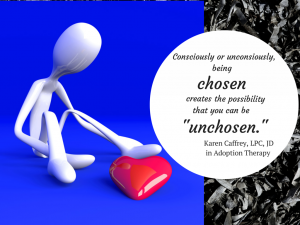Since approximately 60% of Americans have a triad member (adoptee, adoptive parent, or biological parent) in their family, and if you also consider one’s network of friends, acquaintances, coworkers, and clients (for those of you who are counselors) the answer is almost certainly “Yes”.
If you would like to better understand what it’s like to be an adoptee, and/or learn how to better help your adoptee clients, I strongly recommend you take a look at this new anthology, Adoption Therapy: Perspectives from Clients and Clinicians on Processing and Healing Post Adoption Issues.
Here’s a quote from my contribution in Chapter 6, “Creating Closeness and Creating Distance: What Therapists Need To Know To Help Adoptees Increase Their Capacity for Emotional Connection”:
“My sad experience in speaking with adoptees who have come to me after receiving counseling from other therapists is that far too often, these counselors (who may be excellently qualified in other respects) lack the education, training, and basic knowledge about the experience of being adopted to adequately help their adoptee clients. Worse, I’ve seen some adoptees whose therapists actively dismissed or denied the impact of being adopted on their client’s lives and concerns. This is as damaging to an adoptee as it would be to tell a person of color that race is not a factor in her life, or in how she experiences herself as being subject to discrimination. In my opinion, counseling adoptees requires a specific competency about the experience of being adopted, both intra-psychically and within our culture.”
Strong words? Perhaps. But the solution is easily available by consulting the ever-growing body of resources like this Anthology, which are increasingly being written by adoptees themselves. (Acknowledging, of course, the powerful contribution of pioneers in adoptee psychology such as Nancy Verrier and Betty Jean Lifton.)
Here’s a more detailed description of what is in this Anthology:
“A much-needed anthology addressing a variety of potential psychological and physiological concerns, Adoption Therapy, Perspectives from Clients and Clinicians on Processing and Healing Post-Adoption Issues is a must-read for adoptees, adoptive parents, first families, and vitally, mental health professionals.
With writing by adoptees, adoptive parents, and clinicians, Adoption Therapy is a first-of-its-kind and wholly unique reference book, providing insight, advice, and personal stories which highlight the specific nature of the adoptee experience.
Topics Include:
- The psychological dangers in leaving trauma and grief buried and unaddressed
- The importance of community in healing the wounds of separation
- Understanding the physical and psychological effects of transracial adoption
- Attachment–including the inability to attach, inappropriate attachment, and the myth of Reactive Attachment Disorder
- Conception by rape: an adoptee speaks out
- Co-dependency, intimacy, and creating closeness
- The life-long effects of pre- and perinatal trauma
- Processing complex trauma, complex grief, and Post-Traumatic Stress Disorder
- Specific concerns for Late Discovery Adoptees
- The relationship among trauma, anger and rage, and substance abuse
- For adoptive parents and adoptees: red flags when working with a therapist.”
I hope you find this Anthology helpful and healing. Comments, reviews and suggestions for further writings are welcome!
My Other Writings On Adoption
- Adoptees And Silent Realities
- When Your Birth Mother Says “No”
- Adult Adoptees: Your Right To Know
- Adoptees’ Greatest Struggles
- Do You Counsel (or Know) Any Adoptees?
- When Do You Tell Your Secret?
- Part II – What You Don’t Know CAN Hurt You: The Beautiful Truth in Father Unknown by filmmaker David Quint
- Part II – “Why Doesn’t She Love Me?”
- Part II – How Could They Have Kept The Fact I Am Adopted From Me? How can I ever trust them, or myself, again?
- Kung Fu (Adoptee!) Panda 3 Movie Review – Part I
- Kung Fu (Adoptee!) Panda 3 Movie Review – Parts II, III and IV (Conclusion)
- Are You An Adoptee With A Question?
- More On A Birth Father’s Right To Know…

